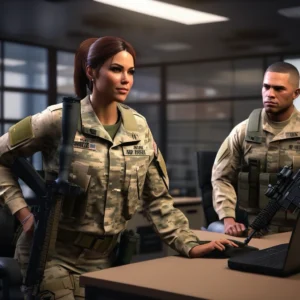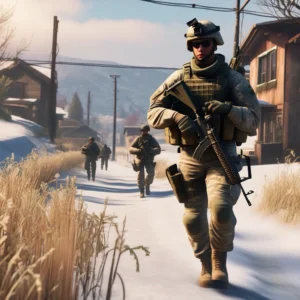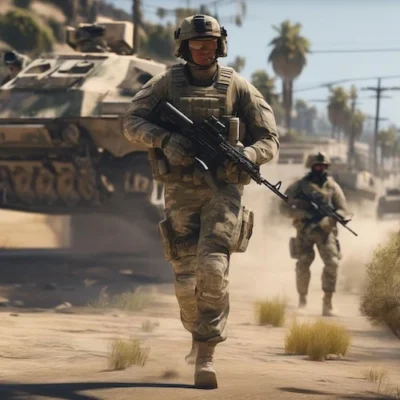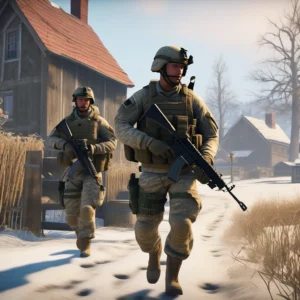Military Sexual Assault Allegations: Aggressive Defense for Article 120 UCMJ
Few allegations in the military justice system carry the immediate stigma, immense pressure, and catastrophic consequences associated with sexual assault. Charges under Article 120 of the Uniform Code of Military Justice (UCMJ) are not merely legal battles; they are fights for your freedom, your career, your reputation, and your entire future. In today’s military climate, where the emphasis on victim support and aggressive prosecution is paramount, an accused service member can often feel “guilty until proven innocent,” facing immense command pressure and public scrutiny.
A conviction for a sexual assault offense can lead to life imprisonment, mandatory sex offender registration, and a dishonorable discharge, effectively erasing everything a service member has built.
Navigating these treacherous waters demands immediate, uncompromising, and specialized legal counsel. This comprehensive guide will dissect the complexities of Article 120 UCMJ, outline the unique challenges of military sexual assault investigations, and detail the aggressive defense strategies essential to protecting your life. At Gonzalez & Waddington, we understand the unique landscape of military sexual assault cases and stand ready to provide the unwavering, battle-tested defense you need to fight for your future.
I. Understanding Sexual Assault Offenses Under Article 120 UCMJ
Article 120 of the UCMJ defines and prohibits various forms of sexual violence within the military. Since its significant reforms in 2007 and subsequent updates, it has become one of the most frequently amended and aggressively prosecuted articles in military law.
A. The Military’s Stance and Unique Challenges
Sexual assault has been a high-profile issue for the Department of Defense (DoD) for years, leading to a “victim-centric” approach across all branches. This focus, while vital for supporting survivors, often creates a challenging environment for the accused. Commanders face immense pressure to address allegations swiftly and decisively, and prosecutors are often under directives to secure convictions. This environment can sometimes lead to a presumption of guilt for the accused, making a robust defense even more critical.
Unique challenges in military sexual assault cases include:
- Command Influence: While unlawful, subtle or overt pressure from the chain of command to achieve a particular outcome can exist.
- Restricted vs. Unrestricted Reports: Victims have options to report, impacting whether law enforcement and command are immediately notified.
- Special Victims’ Counsel (SVC): Victims are provided with their own legal counsel, emphasizing their rights.
B. Key Definitions and Elements of Article 120 UCMJ
Article 120 covers a spectrum of offenses. Understanding the precise legal definitions is paramount for both prosecution and defense:
- Rape (Subsection a): A person commits a sexual act upon another by:
- Using unlawful force against the other person.
- Using force causing or likely to cause death or grievous bodily harm.
- Threatening or placing that other person in fear (of death, grievous bodily harm, or kidnapping).
- First rendering that other person unconscious.
- Administering a substance (drug, intoxicant) by force/threat or without knowledge/consent, thereby substantially impairing the victim’s ability to appraise or control conduct.
- Sexual Assault (Subsection b): A person commits a sexual act upon another by:
- Threatening or placing that other person in fear (similar to rape, but for sexual assault).
- Making a fraudulent representation that the sexual act serves a professional purpose.
- Inducing a belief by artifice, pretense, or concealment that the person is another person (impersonation).
Or, a person commits a sexual act upon another:
- Without the consent of the other person.
- When the person knows or reasonably should know that the other person is asleep, unconscious, or otherwise unaware that the sexual act is occurring.
- When the other person is incapable of consenting due to impairment (drug/intoxicant) or mental disease/defect/physical disability, and that condition is known or reasonably should be known by the accused.
- Aggravated Sexual Contact (Subsection c): Occurs if a person commits or causes sexual contact upon another, if that conduct would constitute Rape (Subsection a) had it been a sexual act.
- Abusive Sexual Contact (Subsection d): Occurs if a person commits or causes sexual contact upon another, if that conduct would constitute Sexual Assault (Subsection b) had it been a sexual act.
C. Critical Definitions within Article 120 UCMJ
The definitions of key terms are central to proving or disproving an Article 120 violation:
- “Sexual Act”: The penetration, however slight, of the penis into the vulva, anus, or mouth; contact between the mouth and the penis, vulva, scrotum, or anus; or any penetration of the vulva, penis, or anus by any part of the body or object, with intent to abuse, humiliate, harass, degrade, or to arouse/gratify sexual desire.
- “Sexual Contact”: Touching, or causing another person to touch (directly or through clothing), the vulva, penis, scrotum, anus, groin, breast, inner thigh, or buttocks, with intent to abuse, humiliate, harass, degrade, or to arouse/gratify sexual desire.
- “Consent”: Defined as a freely given agreement to the conduct at issue by a competent person. Crucially:
- An expression of lack of consent through words or conduct means there is no consent.
- Lack of verbal or physical resistance does not constitute consent.
- Submission resulting from force, threat, or fear does not constitute consent.
- A current or previous dating/social/sexual relationship, or the manner of dress, does not by itself constitute consent.
- A sleeping, unconscious, or incompetent person cannot consent.
- A person cannot consent if under threat, in fear, or if force causing death/grievous bodily harm is used.
All surrounding circumstances are considered in determining consent.
- “Force”: Includes use of a weapon, physical strength/violence sufficient to overcome/restrain/injure, or inflicting physical harm to coerce submission.
- “Incapable of Consenting”: The person is either incapable of appraising the nature of the conduct or physically incapable of declining/communicating unwillingness.
II. The Investigation Process: Your First Battleground
For sexual assault allegations, the investigation phase is a critical battleground. What happens here can profoundly impact the rest of your case.
A. Initial Allegation and Reporting
Allegations of sexual assault are typically reported through a Sexual Assault Response Coordinator (SARC), a Victim Advocate (VA), or directly to military law enforcement agencies such as NCIS (Navy/Marine Corps), CID (Army), or OSI (Air Force). Depending on the reporting option (Restricted or Unrestricted), law enforcement may be immediately notified and begin an investigation.
B. Unique Challenges of Military Sexual Assault Investigations
Military sexual assault investigations are often highly sensitive and distinct:
- Victim-Centric Approach: Investigations prioritize the alleged victim’s well-being and account, often leading to a challenging environment for the accused.
- Forensic Examinations: Sexual Assault Forensic Examinations (SAFE, formerly SANE exams) are common, collecting physical evidence from the alleged victim.
- Witness Interviews: Investigators conduct interviews with the alleged victim, witnesses, and the accused.
- Digital Evidence: Phones, computers, and social media are frequently scrutinized.
C. Your Critical Rights During Investigation: Invoke Them Immediately!
The moment you become aware you are under investigation or are suspected of a sexual assault offense, your absolute first priority must be to invoke your rights and secure legal counsel. Any delay or misstep here can be catastrophic:
- Article 31b UCMJ – The Military Miranda Warning: If you are a suspect and being questioned, you must be advised of your rights: the right to remain silent and the right to an attorney (military or civilian). You must unequivocally state, “I choose to remain silent, and I want to speak with a lawyer.” Do not provide any explanations, justifications, or informal statements. Your silence cannot be used against you.
- Right to Refuse Consent to Searches: Law enforcement may ask for consent to search your phone, computer, barracks room, or vehicle, or to collect your DNA. You have the right to refuse consent. Do not consent to any search without consulting an attorney. If they have probable cause, they can obtain authorization, but your refusal forces them to follow proper legal procedures.
- Danger of Speaking Informally: Even informal conversations with your chain of command, coworkers, or friends about the allegations can be used against you. Assume any statement you make can become evidence.
III. The Court-Martial Process for Article 120 Allegations
Sexual assault allegations almost invariably lead to a court-martial, typically a General Court-Martial, the most serious type of military criminal trial. The process is lengthy, complex, and demands relentless legal advocacy.
A. Preferral and Referral: High Likelihood of General Court-Martial
Once an investigation concludes, charges are “preferred” by a commissioned officer. Due to the severity of Article 120 offenses, cases are almost always “referred” to a General Court-Martial by a high-ranking Convening Authority.
B. Pre-Trial Confinement/Restrictions
It is common for service members accused of sexual assault to be placed in pre-trial confinement or under significant liberty restrictions. This decision is subject to review by a neutral commander within 72 hours and a military judge within 7 days. Your defense counsel can challenge these decisions.
C. Article 32 Preliminary Hearing
For General Courts-Martial, an Article 32 hearing is mandatory. This is a critical opportunity for the defense to examine the government’s evidence, cross-examine witnesses (including the accuser in some cases), and gather information. While its role has been modified, it remains a vital discovery and challenge phase to identify weaknesses in the prosecution’s case.
D. Pre-Trial Motions
Before trial, your defense counsel will file various motions with the military judge to:
- Suppress Evidence: Seek to exclude evidence obtained in violation of your rights (e.g., illegal searches, coerced confessions).
- Challenge Jurisdiction: Argue that the military lacks jurisdiction over the offense or the accused.
- Discovery: Demand all relevant evidence from the prosecution.
- Unlawful Command Influence (UCI): Argue that improper pressure or influence from command has tainted the process.
E. Trial Phase (General Court-Martial)
The court-martial trial is a formal criminal proceeding that adheres strictly to the Military Rules of Evidence (MRE) and the “Beyond a Reasonable Doubt” standard of proof.
- Military Judge Alone vs. Court Members: A crucial strategic decision is whether to have your case decided by a military judge alone or by a panel of court members. Your defense counsel will advise on which option offers the best chance of success.
- Voir Dire: If you choose a member panel, your defense counsel will rigorously question potential members to identify and remove any biases that could compromise your right to a fair trial.
- Phases of Trial:
- Opening Statements: Both sides present their case overview.
- Prosecution’s Case: The government presents witnesses (including the accuser, investigators, and experts) and evidence.
- Defense’s Case: Your defense counsel presents evidence, calls defense witnesses, and may advise you on whether to testify under oath, provide an unsworn statement, or remain silent. This is a highly strategic decision with significant implications.
- Closing Arguments: Both sides summarize their arguments and persuade the judge or members.
- Findings (Verdict): The judge or court members deliberate and vote on your guilt or innocence for each charge.
- Sentencing Phase: If found guilty, a separate sentencing hearing occurs where aggravating evidence is presented by the prosecution, and extensive extenuation and mitigation evidence is presented by the defense to argue for a lighter sentence.
IV. Aggressive Defense Strategies for Article 120 UCMJ
Successfully defending against Article 120 allegations requires an aggressive, multi-pronged approach that scrutinizes every aspect of the prosecution’s case and vigorously asserts your rights. Gonzalez & Waddington employs battle-tested strategies to dismantle the government’s narrative.
A. Challenging the Element of Consent
Consent is often the central battleground in Article 120 cases. The prosecution must prove the absence of consent beyond a reasonable doubt. Defense strategies include:
- Arguing Actual Consent: Presenting evidence that the alleged victim freely and knowingly agreed to the sexual conduct. This can involve text messages, emails, witness testimony, or prior consistent statements.
- Mistake of Fact as to Consent: Argue that, even if consent was not given, the accused had an honest and reasonable belief that consent was present, based on observable words or conduct. This is a complex defense.
- Challenging Incapacity to Consent: If the prosecution alleges incapacitation (due to alcohol, drugs, sleep, or mental condition), the defense can argue the alleged victim was not, in fact, incapacitated, or that the accused neither knew nor reasonably should have known of such incapacitation.
- Credibility of Accuser: Through rigorous cross-examination, exposing inconsistencies in the accuser’s statements, prior false allegations (where legally admissible), motives to fabricate or exaggerate (e.g., to avoid disciplinary action, relational issues), or discrepancies between their testimony and physical/forensic evidence.
B. Disputing the Sexual Act/Contact or Identity
- No Sexual Act/Contact Occurred: Directly refuting that the alleged sexual act or contact took place.
- Mistaken Identity: Arguing that the accused was not the perpetrator.
- Alibi: Providing proof that the accused was elsewhere when the alleged incident occurred.
C. Challenging Forensic and Physical Evidence
Forensic evidence is often presented as irrefutable, but it can be challenged:
- SANE Exam Issues: Questioning the proper collection, documentation, handling, and chain of custody of evidence from a Sexual Assault Forensic Exam (SANE).
- DNA Evidence: Challenging the source of DNA, the potential for contamination, the interpretation of results, or the laboratory’s methodology. DNA can only prove presence, not consent.
- Digital Evidence: Scrutinizing the authenticity, chain of custody, and interpretation of text messages, emails, photos, or videos.
D. Constitutional/UCMJ Rights Violations
Any violation of the accused’s rights can lead to the suppression of evidence or even dismissal of charges:
- Article 31b UCMJ Violations: If the accused was questioned without being properly advised of rights or if questioning continued after rights were invoked.
- Illegal Searches and Seizures: Evidence obtained through unlawful searches (without probable cause or proper authorization).
- Unlawful Command Influence (UCI): If commanders or senior officials improperly pressured investigators, witnesses, or court members, this can be grounds for dismissal or reversal.
E. Affirmative Defenses and Mitigating Evidence
- Alibi: Proving the accused was in a different location at the time of the alleged incident.
- Mental Health Issues/Substance Abuse: While not a direct excuse, evidence of underlying mental health conditions (PTSD, TBI, MST, depression, anxiety) or substance abuse issues can be presented to mitigate culpability, explain behavior, or argue for rehabilitation over severe punishment.
- Good Military Character: Presenting evidence of the accused’s exemplary service record, awards, and character references to portray them as a dedicated service member who would not engage in such conduct.
V. The Catastrophic Consequences of an Article 120 Conviction
A conviction for a sexual assault offense under Article 120 UCMJ is one of the most devastating outcomes in military law, carrying profound and life-altering consequences.
A. Punitive Discharge
A conviction for rape or sexual assault almost guarantees a punitive discharge: a Dishonorable Discharge (DD) or Bad-Conduct Discharge (BCD). These are the most severe forms of military separation and are permanent marks on your record.
B. Confinement
Convictions for Article 120 offenses carry lengthy prison sentences, ranging from years to life imprisonment, depending on the specific offense and aggravating factors.
C. Sex Offender Registration (SORNA)
A conviction for most sexual assault offenses under Article 120 UCMJ will result in mandatory, lifelong registration as a sex offender under the federal Sex Offender Registration and Notification Act (SORNA) and corresponding state laws. This imposes severe restrictions on where you can live, work, and travel, making reintegration into civilian society extremely challenging.
D. Loss of VA Benefits
A punitive discharge (DD or BCD) stemming from an Article 120 conviction will generally lead to the complete loss of nearly all Veterans Affairs (VA) benefits. This includes the Post-9/11 GI Bill, Montgomery GI Bill, VA healthcare, disability compensation, and VA home loans, representing a loss of hundreds of thousands of dollars in earned benefits.
E. Civilian Life Impact
- Federal Criminal Record: A court-martial conviction for an Article 120 offense creates a federal criminal record, which is visible in background checks and will severely impact all aspects of civilian life.
- Employment Challenges: Securing civilian employment, especially in positions of trust or requiring security clearances, becomes virtually impossible.
- Professional License Revocation: Convictions can lead to the revocation of professional licenses (e.g., medical, legal, teaching) and a bar from obtaining future licenses.
- Social Stigma: The stigma of a sexual assault conviction and sex offender registration is profound, leading to social ostracization and immense personal challenges.
VI. Why Gonzalez & Waddington is Your Unrivaled Defense for Article 120 Cases
When your life hangs in the balance due to military sexual assault allegations, you cannot afford to take chances. You need a defense team that is not only experienced in military law but also aggressive, independent, and intimately familiar with the complexities of Article 120 UCMJ. Gonzalez & Waddington provides precisely this unrivaled defense.
A. Unmatched Expertise in Sexual Assault Defense
Our attorneys possess a profound and specialized understanding of Article 120 UCMJ, its intricate definitions of sexual acts, sexual contact, and consent, and the evolving interpretations by military appellate courts. We are highly skilled in analyzing forensic evidence (DNA, SANE exams), challenging the government’s expert witnesses, and dissecting the nuances of accuser credibility. We understand the unique policies and procedures surrounding military sexual assault, including SAPR protocols and Special Victims’ Counsel.
B. Absolute Independence from Command Pressure
In cases of military sexual assault, the pressure on commanders and prosecutors to secure convictions can be immense. Unlike military-appointed counsel, Gonzalez & Waddington operates with complete independence from the military chain of command. Our sole loyalty is to you, our client. This allows us to aggressively challenge the government’s case, pursue every available defense, and directly confront any improper influence or procedural misconduct without fear of career repercussions.
C. Aggressive, Battle-Tested Trial Lawyers
Article 120 cases are often complex, emotional, and require exceptional trial advocacy. Our attorneys are not just legal advisors; they are battle-tested litigators with a proven track record of success in high-stakes court-martial settings. We excel at rigorous cross-examination, conducting effective voir dire to uncover juror bias, strategically presenting defense evidence, and crafting compelling arguments that persuade judges and court members. We fight relentlessly to achieve acquittals or the best possible outcome.
D. Proactive and Comprehensive Representation
Our defense begins the moment you contact us. We intervene immediately during the investigation phase to protect your critical Article 31b rights and prevent self-incrimination. We conduct thorough, independent investigations, meticulously review all evidence, and file strategic pre-trial motions to suppress illegally obtained evidence or challenge the charges. Our comprehensive representation covers every stage, from initial accusation and pre-trial confinement hearings to the court-martial trial, sentencing, and any necessary post-trial appeals or relief efforts, ensuring no stone is left unturned in protecting your future.
E. Understanding the Stigma and Fighting for Due Process
We recognize the immense personal and professional stigma that accompanies sexual assault allegations. Our firm is dedicated to ensuring that every accused service member receives full due process and a fair trial, even in the face of intense pressure. We are committed to exposing false allegations, challenging weak evidence, and ensuring that justice, not expediency, is served.
VII. Conclusion: Your Life Demands Immediate, Aggressive Defense Against Article 120 Allegations
Being accused of a sexual assault offense under Article 120 UCMJ is one of the most terrifying and consequential events a service member can face. The unique environment of military justice, coupled with the severe penalties, including life imprisonment and mandatory sex offender registration, demands an immediate, unwavering, and highly specialized legal response.
A passive defense or reliance on insufficient counsel is a gamble with your entire future. The complexities of consent, the challenges of forensic evidence, and the nuances of military procedure in these cases require an attorney with deep expertise, an independent mindset, and a proven ability to perform in the courtroom. Your life, your freedom, your career, and your reputation are all on the line. Do not delay.
Your future is too important. Do not face military sexual assault allegations alone.
Contact Gonzalez & Waddington immediately for a confidential consultation.
Call Now: 1-800-921-8607






